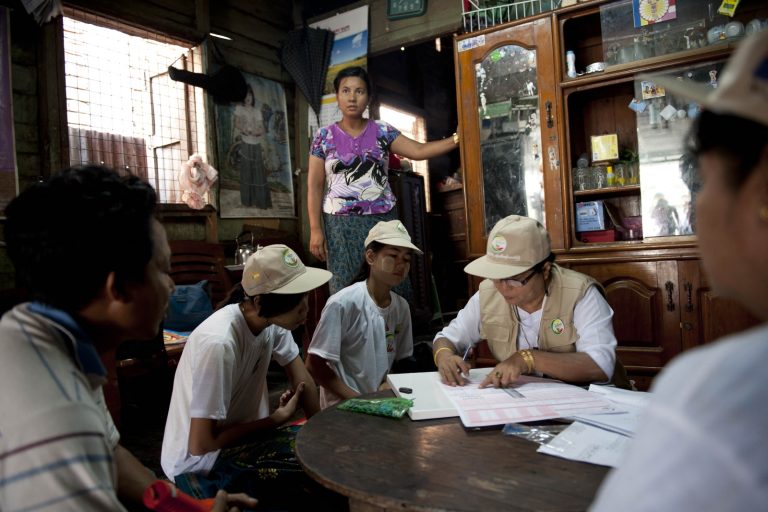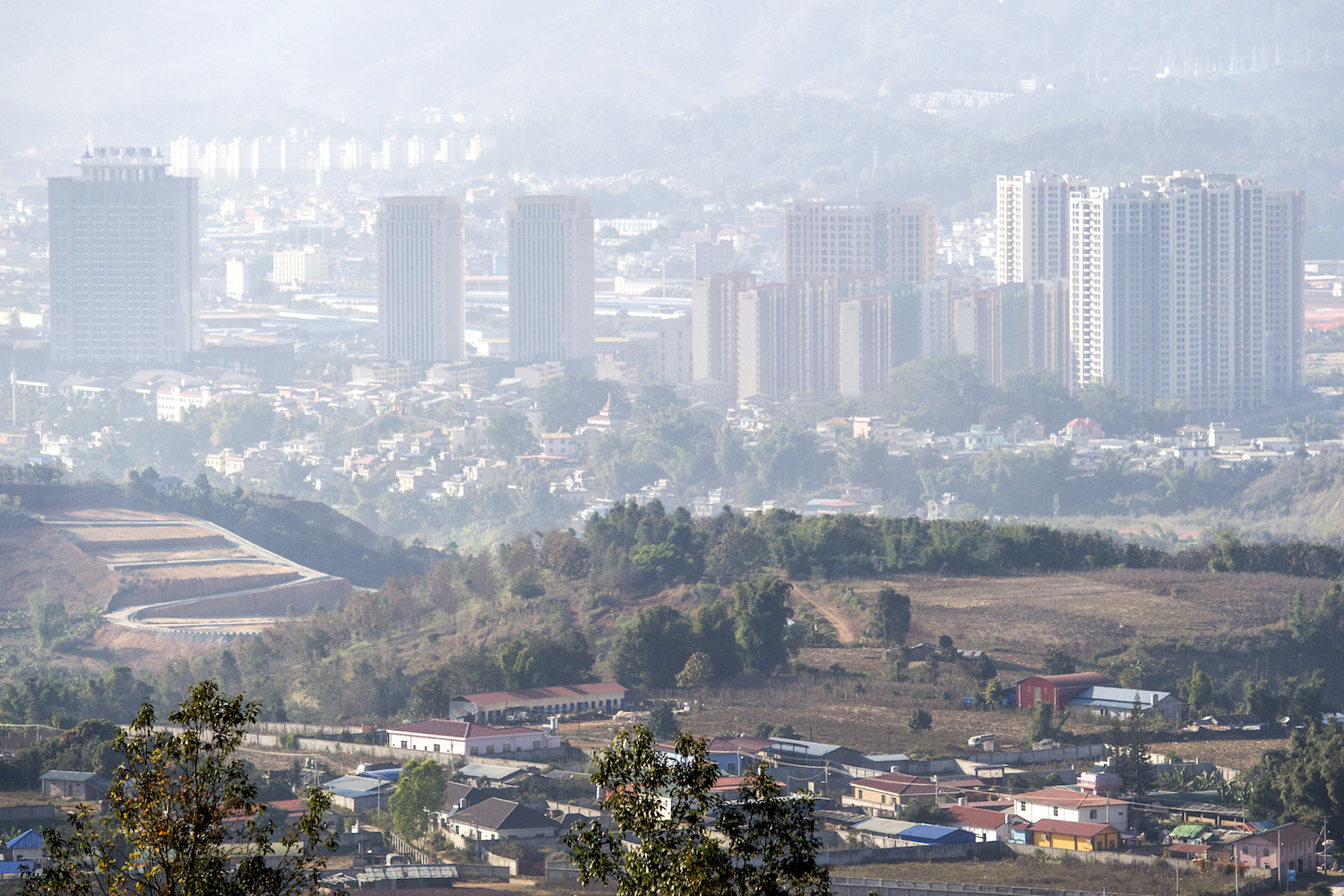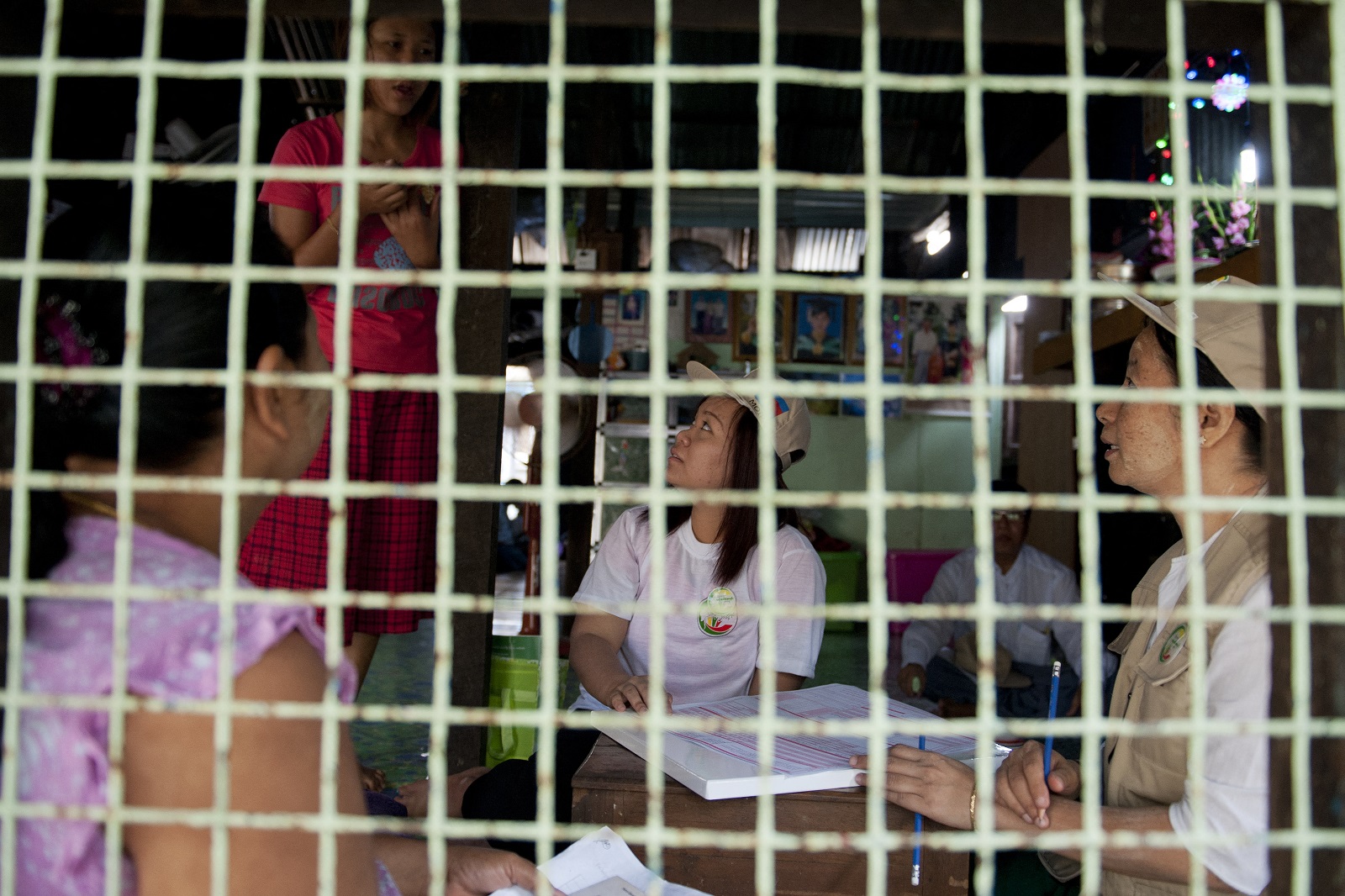The pandemic has wreaked havoc with the plans of domestic election observation groups, but an agile response to travel restrictions means the vote will not go unwatched.
By YE MON | FRONTIER
Sharp daily increases in COVID-19 infections are posing big challenges for the election observer groups keen to monitor all aspects of the election ahead of and during the ballot on November 8.
The Union Election Commission has insisted in the face of soaring COVID-19 cases that the election will not be postponed and it will arrange for voters to safely cast ballots according to guidelines from the Ministry of Health and Sports.
One implication of travel restrictions is that some election observer groups are only able to assign volunteers to the townships where they live.
The disruption comes as domestic election observer groups have been recruiting scores of volunteers for short-term roles, which are limited to observing voting, counting and the tabulation of results.
They will complement the work of observers filling long-term positions, who began monitoring electoral preparations and party campaigns three or four months ago and will also be on duty on election day.
The work of domestic observers is especially vital in the absence of large international missions. These missions have been unable to fly in observers from overseas because of a ban on the arrival of commercial flights imposed on March 30 and repeatedly extended, most recently until October 30. The European Union, which fielded more than 100 foreign observers in 2015, has only been able to deploy an “expert” mission of four consultants; and the United States-based Carter Center, which also had a large foreign mission in 2015, made the unprecedented move of recruiting Myanmar nationals as long-term observers, though their deployment has been limited by domestic travel restrictions.
The domestic observer groups include the Hornbill Organization, which monitored the last general election in 2015, subsequent by-elections and local votes for ward and village tract administrators. The group’s executive director, Ko Chan Lian, said the coronavirus had seriously hobbled its plans for the November 8 vote.
Hornbill recruited 470 volunteers for short-term observation roles but almost 170 have left because of the risk of contracting COVID-19 on election day.
“Some parents are not allowing their sons or daughters to be election observers because of the virus,” he told Frontier in a telephone interview on October 7, adding that Hornbill would not be recruiting replacements.
“We only have 302 volunteers nationwide,” he said. This is a reduction from 2015, when the group fielded 531 short-term observers. However, it has deployed more long-term observers this time compared to the 19 who covered 27 townships in 2015. Currently, 76 long-term observers are monitoring the campaign period in 76 townships.
The UEC set an October 23 deadline for the registration of election observers, for which there are two types of accreditation. Groups that are observing the election process nationally are required to apply for accreditation at the UEC in Nay Pyi Taw and those doing monitoring work in a particular state or region are required to apply with the relevant election sub-commission.
Normally, the groups observing the polls nationally, such as the People’s Alliance for Credible Elections, would apply for accreditation cards, which grant observers access to polling stations, and then distribute them to volunteers during trainings in each state and region. But because of COVID-19 travel restrictions, they have instead had to send the cards with trucks or express buses to volunteers, and shift training online.
PACE plans to deploy about 2,000 volunteers as short-term observers, who will monitor voting and counting at about 1,000 polling stations throughout the country. The group is assigning two people to each polling station; one will monitor inside and the other outside.
But PACE programme manager Ko Han Soe Tun told Frontier that travel restrictions meant it was still unclear whether its volunteers would be able to get to their assigned locations on polling day.
PACE had made arrangements to eliminate the need to travel through townships but did not know if their observers would be able to pass through wards and village tracts.
PACE is also currently deploying 319 long-term observers and another 322 observers are poised to monitor advance voting, he said.
“The 2,000 volunteers are only for election day. Some volunteers have withdrawn because of COVID-19 but not too many, only two or three people,” Han Soe Tun said, adding that PACE planned to arrange health insurance for all volunteers.
“We are also providing the observers with protective items, such as masks, face shields and hand sanitiser, as well as transport and will cover the cost of their meals and phone calls,” he added.
The group’s observation mission in 2015 had a similar number of short-term observers, at 2,098, but a much smaller number of long-term observers at 129.
Ma Shwe Yee Win, executive director of Peace and Justice Myanmar, said it had been forced to change plans to deploy 100 volunteers throughout the country. “Everyone is afraid of the coronavirus so we decided to assign them to polling stations near their homes instead,” she said.
The pandemic has also forced observation groups to adjust their plans for training volunteers. Ahead of previous elections, volunteers were trained in physical group sessions but this year they’ve had to use the online videoconferencing app Zoom.
Online training hasn’t been possible for volunteers in seven townships in Rakhine State and neighbouring Paletwa Township in Chin State, however, because the government has restricted mobile phone internet services to 2G, which is not fast enough for video calls and most other applications.
PACE has circumvented this obstacle by emailing training course materials to the Rakhine State capital, Sittwe, where they are transferred to memory sticks for distribution in areas with only 2G services. Sittwe has not been affected by the internet restrictions.
However, Hornbill has cancelled plans to deploy observers in the eight townships with 2G services. “Communicating with the observers would be too difficult, and it is also difficult to travel through other townships,” Chan Lian explained.
On October 16, the UEC announced that voting had been cancelled in nine townships in northern and central Rakhine State – Pauktaw, Ponnagyun, Rathedaung, Buthidaung, Maungdaw, Kyauktaw, Minbya, Myebon and Mrauk-U – as well as some wards and village tracts in Kyaukphyu, Ann, Sittwe and Taungup townships. It is yet to clarify whether voting will go ahead in Paletwa, which has been severely hit by armed conflict.
In response to the announcement, PACE said it had halted the work of 18 long-term observers and 60 short-term observers in Rakhine.
Speaking before the announcement, U Khaing Kaung San from the Arakan State Election Monitoring Leading Committee, an observer group in Rakhine, said it had already decided against sending observers to the state’s northern townships because it assumed that fighting there between the Tatmadaw and Arakan Army would result in voting being cancelled, as proved correct.
“We will focus on southern Rakhine State, including Ann and Taungup townships, where voting is certain to take place,” he said, adding that the committee will have observers at 500 polling stations on November 8.
Secretary of the Rakhine State election sub-commission U Thurein Htut said the Arakan State Election Monitoring Leading Committee was the only Rakhine-based monitoring group to have registered with the sub-commission.
UEC commissioner and spokesperson U Myint Naing told reporters during an online press conference on September 19 that the number of polling stations nationally would be increased from more than 40,000 to more than 50,000 to allow for more social distancing. However, the commission has provided no further details on how existing polling stations will be divided, making it even harder for observer groups to plan for election day.
“They should at least inform the observation groups … We do not know yet about increases in the number of polling stations,” said Hornbill director Chan Lian.
When Hornbill asked the UEC, it referred questions to sub-commissions, he said, but they provided inconsistent information.
Social distancing measures in polling stations, which the UEC has said would be strictly enforced so that voting can proceed safely, also leaves meaningful access for observers in doubt. The counting of ballots, which happens at the polling station after voting concludes at 4pm on election day, needs to be viewed up close in order to be properly assessed.
“We also want to clarify with the UEC whether we can observe inside polling stations or not, because of COVID-19,” said PACE programme manager Han Soe Tun.







